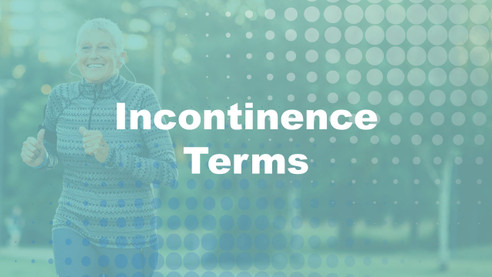2021 Feb 26th
UNDERSTANDING INCONTINENCE: BASIC TERMS
ANAL/ANORECTAL INCONTINENCE
Involuntary loss of gas or feces (solid feces or liquid feces).
Possible causes are:
- Childhood anorectal anomalies and spinal cord defects;
- Damaged anal canal;
- Weakness of the pelvic floor;
- Rectal dysfunction;
- Central Nervous System dysfunction;
- Diarrhea; or
- Overflow incontinence.
Types of anal Incontinence:
(i) Urge anorectal incontinence: Incontinence preceded by an urge to defecate.
(ii) Passive anorectal incontinence: Incontinence not preceded by an urge to defecate.
DOUBLE INCONTINENCE
Having both anal incontinence and urinary incontinence.
ENCOPRESIS
Fecal soiling.
FECAL (RECTAL) URGENCY
A sudden strong feeling to defecate that is difficult to delay.
FECAL URGENCY WARNING TIME
The time from the first sensation of fecal urgency to voluntary defecation or incontinence.
IRRITABLE BOWEL SYNDROME (IBS)
A bowel disorder with symptoms that include cramping, abdominal pain, bloating, gas, and diarrhea or constipation (or both).
OVERFLOW INCONTINENCE (ANORECTAL)
Hardened feces fills the rectum with liquid feces leaking out around the impacted feces.
OVERFLOW INCONTINENCE (URINARY)
Involuntary passing of urine when the bladder is not completely emptied after urination. Small amounts of the remaining urine leak out later due to an overfull bladder.
PASSIVE FECAL INCONTINENCE
Involuntary fecal soiling without sensation or warning.
PRIMARY NOCTURNAL ENURESIS
Long-term urinary incontinence during sleep.
URINARY INCONTINENCE
Involuntary urination or leakage of urine.
Possible causes are:
- stress urinary incontinence due to a dysfunctional urethral sphincter;
- urge urinary incontinence from an overactive bladder; or
- Overflow incontinence due to a blockage or dysfunctional bladder.
~~~
Terms based on definitions given from:
Harvard Medical School. (2021, February 15). Types Of Urinary Incontinence.
https://www.health.harvard.
International Continence Society. (2021, February 15). ICS Glossary of Terminology

